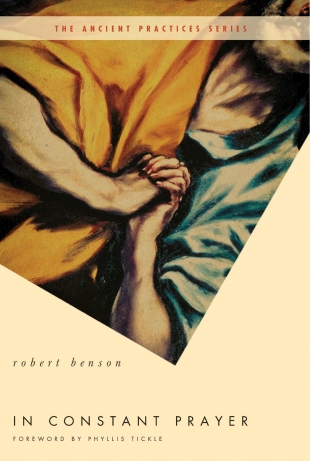"I stumbled into the daily office when I was forty years old. And I have never quite recovered," admits Robert Benson, the acclaimed retreat leader who writes and speaks on the art and practicality of living a more contemplative and prayerful life in the modern world. He has published more than a dozen books about the search for the sacred in the midst of our everyday lives. Benson is one of our Living Spiritual Teachers and the author of this second volume in The Ancient Practices Series edited by Phyllis Tickle for Thomas Nelson. His intention is to open up some of the mystery of the daily office for those who have little or no familiarity with this traditional path of Christian prayer.
Benson explains that the first written versions of daily fixed-hour worship and prayer date back to some 400 years before Christ. The Hebrew people developed a continuous life of worship, taking time to praise Yahweh, and the early Christians continued the practice. Daily prayer was refined for hundreds of years in Christian monasteries. Once the church came to the New World, however, American Protestants abandoned this tradition. Now there is a revival of interest in daily fixed-hour worship.
Some monasteries observe seven times a day for prayer. Others regularly pray two or four times a day. Each office in the cycle of daily prayer contains the same ingredients: versicle, venite, collects, canticle, Psalter, Scripture, response, prayers of the people, and blessing. There are a variety of books containing all the prayers available from different Christian communities.
Benson notes the paradox of this type of worship: "We do these things for God, and then we are the ones who are changed." He admits it is often difficult to say the daily office when in a bad mood, exhausted, or distracted. It helps to remember that there is no magic here, just devotion or what Charles de Foucauld called my "daily offering of fresh flowers to the Beloved Spouse." It also helps to remember that we are participating in an ancient practice that unites us with those who have gone before us and the divine power that shaped and inspired them.
One of Benson's friends, Father Edward J. Farrell, says that the three greatest obstacles to the spiritual life are inertia, amnesia, and mañana. Time is the currency of our age, and we all have a million excuses why we don't do one thing or another. But it only takes about 12 minutes to say the office. Benson admits that it takes discipline to keep up this ancient practice in our daily lives. If we miss it one day, we are reminded by Saint Benedict, "Always we begin again."
So you want to talk and commune with God, where do you do it? Anywhere that is a sacred, quiet place for you. Benson writes:
"I have a friend who takes a particular chair in his living room, the same one he sits in to read the newspapers each day, and he turns the chair to face the window to say his prayers. In this odd sort of way, when the chair is facing the window, it becomes an altar."
Prayer is central to the Christian path, and Robert Benson is the perfect instructor of this form of it because he walks humbly and asks all the right questions. Best of all, he acknowledges the mystery in this ancient devotional practice which infuses everyday life with meaning, delight, and abundant richness.
